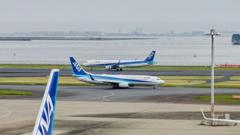The article text:
A Japan Airlines flight from Tokyo to Texas made an emergency landing in Seattle after a passenger attempted to open one of the aircraft's doors mid-flight. All Nippon Airways (ANA) Flight 114, bound for George Bush Intercontinental Airport in Houston, was forced to divert shortly after takeoff on Saturday when issues arose involving an unruly passenger.
According to Port of Seattle police, the unidentified man attempted to open exit doors while airborne, prompting immediate action from both passengers and the flight crew who restrained him. The individual was later transported to a medical facility for evaluation due to what officials described as a “medical crisis.”
ANA later released a statement emphasizing the safety of passengers and crew as their top priority, and expressed gratitude for the assistance of local law enforcement forces during the incident.
While the flight was temporarily halted on the tarmac of Seattle-Tacoma International Airport, authorities reported that another passenger was also removed for displaying unruly behavior. Despite the unplanned diversion, flight data indicated that the plane eventually reached its final destination approximately four hours behind schedule.
This incident echoes a concerning trend in air travel. Similar episodes have occurred, including an April incident where a Jetstar flight from Bali to Melbourne was diverted due to a passenger's attempt to open a door. Likewise, in November, passengers aboard an American Airlines flight resorted to restraining an individual attempting the same act, while yet another incident saw nine Asiana Airlines passengers suffering from breathing issues after an emergency exit was opened mid-flight in South Korea. The continued occurrence of such situations raises questions about mid-flight safety protocols and passenger behavior.
A Japan Airlines flight from Tokyo to Texas made an emergency landing in Seattle after a passenger attempted to open one of the aircraft's doors mid-flight. All Nippon Airways (ANA) Flight 114, bound for George Bush Intercontinental Airport in Houston, was forced to divert shortly after takeoff on Saturday when issues arose involving an unruly passenger.
According to Port of Seattle police, the unidentified man attempted to open exit doors while airborne, prompting immediate action from both passengers and the flight crew who restrained him. The individual was later transported to a medical facility for evaluation due to what officials described as a “medical crisis.”
ANA later released a statement emphasizing the safety of passengers and crew as their top priority, and expressed gratitude for the assistance of local law enforcement forces during the incident.
While the flight was temporarily halted on the tarmac of Seattle-Tacoma International Airport, authorities reported that another passenger was also removed for displaying unruly behavior. Despite the unplanned diversion, flight data indicated that the plane eventually reached its final destination approximately four hours behind schedule.
This incident echoes a concerning trend in air travel. Similar episodes have occurred, including an April incident where a Jetstar flight from Bali to Melbourne was diverted due to a passenger's attempt to open a door. Likewise, in November, passengers aboard an American Airlines flight resorted to restraining an individual attempting the same act, while yet another incident saw nine Asiana Airlines passengers suffering from breathing issues after an emergency exit was opened mid-flight in South Korea. The continued occurrence of such situations raises questions about mid-flight safety protocols and passenger behavior.




















